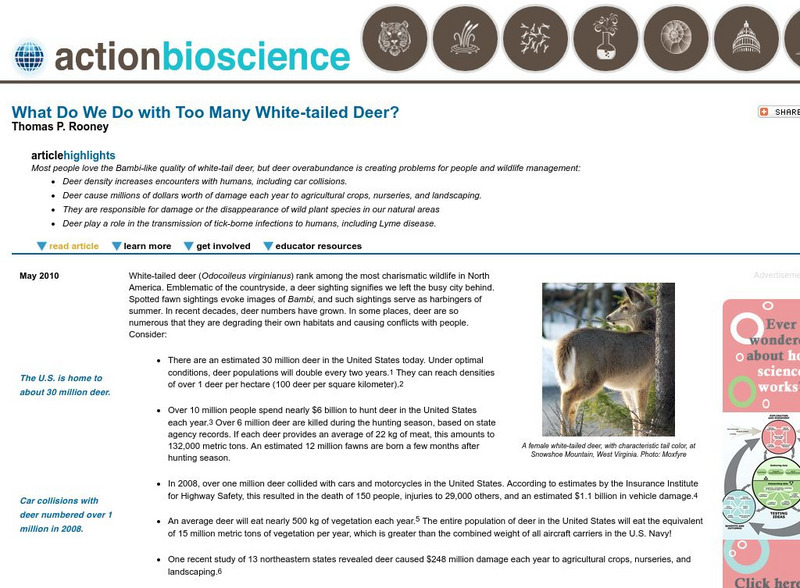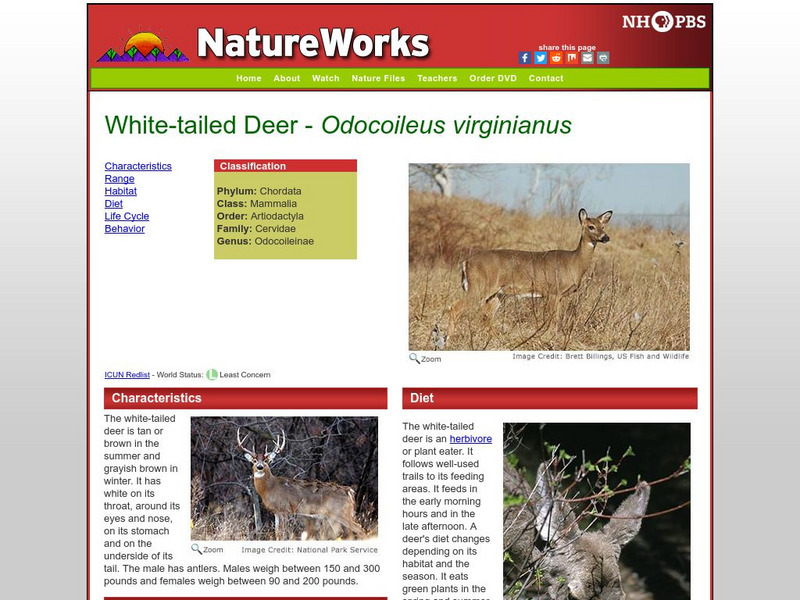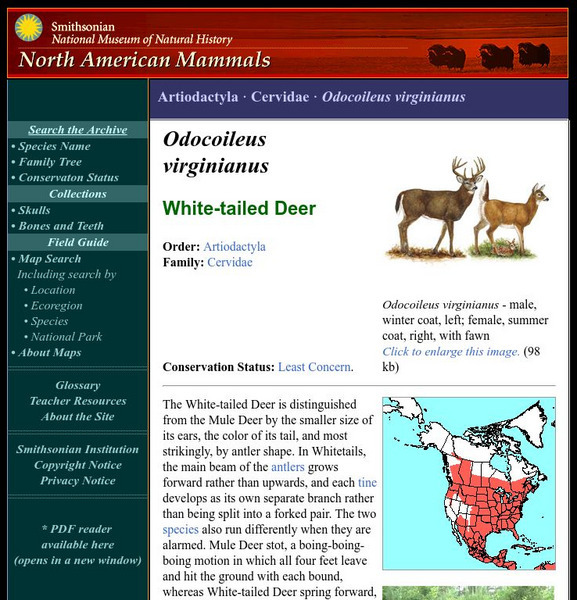American Institute of Biological Sciences
Action Bioscience: What Do We Do With Too Many White Tailed Deer?
The rise in deer population is putting the animals in the way of harm from increased car accidents, damage to agricultural businesses as well as wildlife plant species, and ticks that cause things like Lyme disease. Take a look at...
Canadian Wildlife Federation
Hinterland Who's Who: White Tailed Deer
Canadian Wildlife site features the White-Tailed Deer. Highlights its habitats and habits, feeding and breeding characteristics.
Regents of the University of Michigan
Animal Diversity Web: White Tailed Deer
Comprehensive reference material on the white-tailed deer, wiht information on its appearance, habitat, diet, behavior, reproduction, positive and negative economic significance for humans, and conservation status.
Enchanted Learning
Enchanted Learning: Pond Life Animal Printouts
Filled with printable pages of both plant and animal pond life, Enchanted Learning features fact sheets with color pictures.
Enchanted Learning
Enchanted Learning: Taiga Animal Printouts
Colorful pictures of animals found in the taiga biome such as the arctic fox, bald eagle, gray wolf, and muskrat. Information is provided about each animal when clicked.
PBS
Nh Pbs: Nature Works: White Tailed Deer
Find out what makes the White-Tailed Deer unique when you explore this educational resource. This site identifies characteristics, life cycle, range, behavior, habitat and diet for this mammal.
PBS
Nh Pbs: Nature Works: Temperate Deciduous Forests
NatureWorks offers some fascinating information about the Temperate Deciduous Forests. Students and teachers will learn what makes these forests special, what animals live in this biome, what plants grow in this biome, and more.
PBS
Nh Pbs: Wildlife Journal Jr: White Tails in Winter
Take a look at how the white-tail survives in winter and how feeding deer in winter can cause serious damage. Learn white-tail deer characteristics and discuss steps scientists are taking to determine human feeding effects.
Royal Canadian Geographical Society
Canadian Geographic: Animal Facts: White Tailed Deer
Learn fast facts, the physiology, habitats, behaviors and range of the white-tailed deer.
Environmental Education for Kids
Eek!: Habitats: Forest
Forests are more than just trees. They are a complex community of plants and animals that constantly change, grow, and interact with each other and the nutrient-bearing soils upon which they depend. Read about some of the many plants and...
Encyclopedia of Life
Encyclopedia of Life: White Tailed Deer
The Encyclopedia of Life presents this in-depth overview of White-tailed Deers (Odocoileus virginianus), including their habitats, size, conservation status, and much more. Images of this species and maps of its global distribution can...
Smithsonian Institution
National Museum of Natural History: Hall of Mammals: White Tailed Deer
Brief overview of the white-tailed deer and accompanying photos demonstrate the physical adaptations that allow this animal to mate and feed their babies.
Smithsonian Institution
National Museum of Natural History: Hall of Mammals: Sika
Brief illustrated overview of the sika deer and an accompanying video demonstrate the physical adaptations that allow this animal to eat and use its voice to attract females.
Smithsonian Institution
National Museum of Natural History: American Mammals: White Tailed Deer
The White-tailed Deer is distinguished from the Mule Deer by the smaller size of its ears, the color of its tail, and most strikingly, by antler shape. In Whitetails, the main beam of the antlers grows forward rather than upwards, and...












